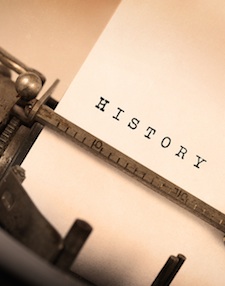By Rebecca McCarron
NPR recently published an article entitled “The Future of American History,” which raised some interesting points regarding the challenges facing History in higher education. The article pointed to the falling percentages of History majors beginning as early as 2010 across the United States as cause for concern. To quote the author, Linton Weeks, “teaching American history in the contemporary classroom — and in the coming years — holds some particular, and complicated, challenges.” More specifically, many educators sense that History is being taught in a newly broadened more politically aware form.
Robert Townsend, who writes for the American Historical Association, also commented on the decline of History majors citing “the gap between the range of students showing an advanced interest in history at the high school level (or at least an advanced interest in avoiding further history study at the college level) and the demographics of the students who major in history” as a major part of the discipline’s challenge — a challenge which has presented itself in the controversies, like the one surrounding the AP U.S History test.
Some felt that the test’s presentation of American history helped create what William M. McClay described at a talk at Hillsdale College as the “loss of faith in the central importance of history” which “pervades all of American society.” Others argued that having largely one select group responsible for what material survived and how that material was recorded left many perspectives discarded from history curriculums, until recently. As Ted Dickinson, a framer of the test, suggested in Politico: “Or do you encourage citizenship and patriotism by talking about not just the positives aspects of our history but also the parts that are negative and how we as a country strive to overcome those?”
However, it would be unfair and inaccurate to say that all of history’s challenges are new. Take for example the arguments that history is low on impartially selected facts and high on bias, multiple perspectives, relativity, and the complications of memory. These inevitably follow from having largely one select group responsible for which material survived and how that material was recorded. As a result, even when primary sources are available, they must be examined critically. Basically, the historical narrative is told by those in power, and even seemingly direct sources such as newspaper articles or legal documents from the time in question must account for that fact. Add in the modern difficulties that arise from the largely undocumented perspectives of those whose contributions to history were deemed largely unnecessary until recently, and the result is discouraging.
Certainly, history as a discipline requires an examination of multiple perspectives, but one that is balanced. It is the challenge of finding that balance that has struck up debate in the historical and political realms alike. However, despite the differences among experts, there is still some common ground to be found. Since the complications of history prohibit it from being strictly an art or a science, historians’ research cannot predict the future, nor should it convince readers how to act in the present. With this in mind, the goal of historians and their students ought to be reading critically and writing well in order to provide an answer to the inevitable, lurking question so what, why does this matter?
Rebecca McCarron is a junior at The Catholic University of America majoring in history and minoring in Spanish. The Catholic University of America is home to the Beta of D.C. Chapter of Phi Beta Kappa.




